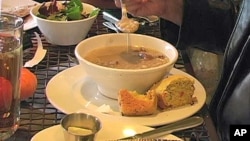The second largest Native American tribe, Tohono O'odham, has the highest rate of adult onset diabetes in the world. Many of the tribe's 28,000 members live on a reservation in the desert in the U.S. southwest state of Arizona. Until 1960, no one had diabetes because people ate traditional foods that helped prevent the disease. But with the introduction of foods high in fat and calories, diabetes became widespread, including in children. Now the O'odham people are being encouraged to go back to eating the traditional foods and a cafe on the reservation is making those foods appealing.
This is lunch hour at the Desert Rain Cafe on the Tohono O'odham reservation in Arizona. Each dish contains at least one traditional food from plants that grow on the reservation. This popular chicken sandwich has a sauce made from Prickly Pear cactus. Customers are raving about the tasty and healthy food.
The cafe also serves calcium rich cholla buds from the Cholla cactus, and fruit smoothies with nutritious chia seeds. Cafe manager Sam Saunders says another popular meal is meat with high protein tepary beans. He also says he put seeds from a giant cactus in the region in some dishes.
"These are the saguaro seeds that are grown on the Saguaro cactus. It's harvested only one time a year," he explained.
Tristan Reader, Co-Director of the Tohono O'odham Community Action group, started the cafe to encourage people to eat traditional foods.
"A mom might be able, if she doesn't have time to cook, she can come in, get those good, healthy foods, and take them home for dinner," Reader explained.
Tribal health officials say up to 70 percent of the O'odham people have diabetes. Reader says the traditional foods can prevent diabetes, which affects children as young as six years old.
"The same compounds that let the plant survive actually regulate blood sugar levels. They keep blood sugar levels even and help prevent diabetes and keep diabetics healthier," he said.
Faith Pablo is with a diabetes prevention program on the reservation and is testing this woman's blood sugar level.
"We want people to eat more traditional foods again, to use more of those foods that weren't raising sugars, to get people to become more aware of what they're putting in their bodies," Pablo said.
Traditionally, the Tohono O'dham were farmers who harvested food from native plants and grew crops that could withstand the desert heat. But today few people farm and the cafe is growing its own crops.
Farm manager Noland Johnson says the tepary bean is one of the world's most heat resistant.
"They're very drought tolerant. I've seen them go up to 4 or 5 weeks without water," he explained.
The farm also plants corn that sprouts quickly from the dry earth. The corn is served at the café and is also dried for future use.
"It's pretty much saved for years, that you can keep it and store it, and then eat is when you need it," Johnson said.
The Desert Rain Cafe is introducing traditional foods to young people who may not have eaten them before. This girl says it would be hard to give up some of the less healthy foods she's used to eating.
Reader says he wants schools on the reservation to serve traditional foods, instead of high calorie and fatty meals.
"And if a kid grows up eating traditional foods, one or two meals a day, every day at school, then that's what they are going to be used to," he said.
He says bringing back traditional foods is also important in preserving the Tohono O'odham culture, because those foods are part of stories and used in ceremonies.
News
Native American Tribe Has Highest Rate of Adult Onset Diabetes Worldwide
update

Until 1960, no one had diabetes because people ate traditional foods that helped prevent the disease. But with the introduction of foods high in fat and calories, diabetes became widespread among the Tohono O'odham tribe.



